
Journal of Austrian Studies
metrics 2024
Bridging Tradition and Modernity in Austrian Studies
Introduction
The Journal of Austrian Studies, published by University of Nebraska Press, serves as a vital academic platform dedicated to the exploration of Austrian culture, literature, and theory, making significant contributions to the interdisciplinary fields of Cultural Studies and Literature. Established in 2012, this esteemed journal boasts an ISSN of 2165-669X and an E-ISSN of 2327-1809, reflecting its commitment to broad scholarly communication. Despite being positioned in Q4 for Cultural Studies and Q3 for Literature and Literary Theory as of 2023, its focus on innovative research and critical discourse allows it to remain relevant in the academic community. With Scopus rankings indicating its niche yet important place among related journals, the Journal of Austrian Studies aims to foster understanding of Austria's rich cultural heritage and its contemporary implications, appealing to researchers, professionals, and students alike who seek rigorous analysis and scholarly debate. This journal provides an inclusive forum for sharing ideas and developments, contributing to the evolving dialogue in Austrian studies.
Metrics 2024
 0.10
0.10 0.10
0.10 0.10
0.10 6
6Metrics History
Rank 2024
Scopus
JCI (Web Of Science)
Quartile History
Similar Journals
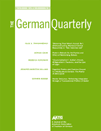
GERMAN QUARTERLY
Elevating Understanding of German Arts and HumanitiesGERMAN QUARTERLY, published by Wiley, is a distinguished academic journal that serves as a vital platform for scholarly discourse in the fields of Cultural Studies, Literature and Literary Theory, and Visual Arts and Performing Arts. With an ISSN of 0016-8831 and an E-ISSN of 1756-1183, this journal is committed to exploring the complexities of German literature and culture from a multi-faceted perspective. It stands out in its categories, ranking Q3 in Cultural Studies and Q2 in both Literature and Literary Theory and Visual Arts and Performing Arts, as of 2023. Its Scopus ranking highlights its relevance and contribution to ongoing dialogues within the arts and humanities, making it an essential read for researchers and professionals alike. Although not an open-access journal, GERMAN QUARTERLY maintains a rigorous peer-review process, ensuring that published works meet the highest standards of academic quality. With converged contributions from 2002 to 2024, it continues to provide valuable insights and foster a deeper understanding of German heritage and its impact on contemporary culture. The journal is an indispensable resource for students and researchers seeking to broaden their knowledge and engage with the latest scholarship in these vital areas of study.

PORTUGUESE STUDIES
Charting New Territories in Portuguese StudiesPORTUGUESE STUDIES is a prominent academic journal published by the Modern Humanities Research Association, dedicated to exploring the rich tapestry of Portuguese culture, history, and literature. With its ISSN 0267-5315 and E-ISSN 2222-4270, the journal has been a vital resource for scholars since its inception in 2002 and continues to contribute valuable insights into the study of Portuguese heritage. Operating from its base in the United Kingdom, the journal encompasses a diverse range of topics that reflect its dynamic scope within Cultural Studies, History, and Literature and Literary Theory. Although currently not categorized as Open Access, the journal's scholarly contributions have attained respectable Scopus rankings, with Q4 and Q3 placements illustrating its growing influence within the academic community. Researchers, professionals, and students alike will find PORTUGUESE STUDIES an indispensable platform for enriching their understanding and discourse on Portuguese affairs, ensuring its crucial role in fostering intellectual engagement and discovery in the humanities.
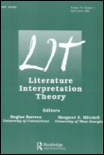
LIT-Literature Interpretation Theory
Unraveling the Tapestry of Textual Interpretation.LIT-Literature Interpretation Theory is a premier academic journal that delves into the intricate relationships between literature and various interpretative theories, published by Routledge Journals, Taylor & Francis Ltd. With an ISSN of 1043-6928 and E-ISSN 1545-5866, this journal has established a notable reputation within the field, evidenced by its ranking in the 71st percentile among peers, and its placement in Q3 of the Literature and Literary Theory category for 2023. Since its inception in 1989 and continuing through 2024, LIT has aimed to provide a platform for the examination of literary texts through diverse theoretical lenses, catering not only to scholars and researchers but also to students and practitioners interested in literary discourse. Although it does not offer open access, the journal continues to be a vital resource for those seeking to enhance their understanding of literary theory within the arts and humanities. With robust insights and critical analyses, LIT contributes significantly to ongoing conversations in literature and promotes innovative interpretations that challenge conventional perspectives.
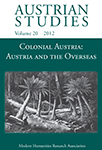
Austrian Studies
Unveiling Austria: A Journey Through Culture and HistoryAustrian Studies, published by the Modern Humanities Research Association, stands as a unique and essential platform for scholarly work focusing on the diverse aspects of Austrian culture, history, and politics. With its ISSN 1350-7532 and E-ISSN 2222-4262, this journal operates from its headquarters in the United Kingdom, offering a rich tapestry of interdisciplinary research to its readers. Although it currently lacks an open access model, it continues to contribute significantly to fields such as Cultural Studies, History, Political Science, and Visual Arts, as evidenced by its categorization in the fourth quartile in 2023. Despite its modest rankings in Scopus, where it falls within the lower percentiles across various categories, Austrian Studies encourages innovative discourse and exploration of pivotal themes in Austrian identity and scholarship. Researchers, professionals, and students alike will find this journal a valuable resource for deepening their understanding of Austria’s multifaceted cultural landscape.

MELUS
Fostering Transformative Ideas in American LiteratureMELUS (Modern English Language and Literature Studies), published by Oxford University Press Inc, is a leading academic journal dedicated to exploring the complexities and dynamics of American literature and culture from various critical perspectives. With a strong historical foundation since its inception in 1974, MELUS is recognized for its contributions to both Cultural Studies and Literature and Literary Theory, achieving notable rankings in the Q2 and Q3 quartiles respectively as of 2023. The journal's articles are essential for scholars and practitioners seeking to engage with contemporary literary discourse, featuring innovative research that challenges conventional understandings of cultural identity and representation. Although it does not offer Open Access options, MELUS remains a crucial resource for academic libraries and research institutions in the United States and beyond, providing access to cutting-edge scholarship that informs the study of literature in a global context. For those invested in the field, MELUS serves as an invaluable platform for disseminating transformative ideas and fostering discussions that shape the future of literary studies.
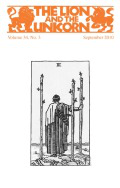
LION AND THE UNICORN
Illuminating the intersections of narrative and pedagogy.The Lion and the Unicorn, published by Johns Hopkins University Press, is a premier journal in the field of Literature and Literary Theory, recognized for its critical contributions to the study of children's literature and its interdisciplinary connections. With an impressive Q2 categorization for 2023 and a Scopus rank placing it in the top 71st percentile of its field, this journal showcases innovative research and scholarly discourse that pushes the boundaries of literary criticism. Researchers, educators, and students alike will find a wealth of knowledge in its compelling articles that explore narratives, themes, and the cultural significance of literature. Published biannually, it invites contributions that interrogate the intersections of literature, culture, and pedagogy, fostering a vibrant dialogue among its diverse readership.

Teksty Drugie
Advancing Scholarly Discourse in LiteratureTeksty Drugie is a premier academic journal dedicated to the field of Literature and Literary Theory, published by the Polish Academy of Sciences, Institute of Literary Research. With its issuance beginning in 2008 and extending intermittently to 2020, this journal has been a significant contributor to literary scholarship in Poland and beyond. The journal holds a commendable Q2 ranking in its category for 2023, indicating its influential status amongst peers in the Arts and Humanities realm, and an impressive Scopus rank of #736 out of 934 in the Literature and Literary Theory domain, with a 21st percentile ranking. Researchers and students will find this journal invaluable for its rigorous academic standards and insightful contributions to contemporary literary discourse. While traditionally available through subscription, Teksty Drugie remains an essential resource for those engaged in the study of literature, offering critical theoretical perspectives and a forum for scholarly debate. The journal is located at ul. Nowy Świat 72, Pałac Staszica, Room 1, Warszawa 00-330, Poland.
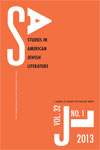
Studies in American Jewish Literature
Celebrating the Legacy of Jewish Literary ContributionsStudies in American Jewish Literature, published by Penn State University Press, is a premier academic journal that delves into the rich tapestry of Jewish literary expression in America. With an ISSN of 0271-9274 and an E-ISSN of 1948-5077, this journal serves a vital role in the fields of Literature and Literary Theory, Cultural Studies, and Anthropology, as evidenced by its placement in the Q1 to Q3 quartiles across various categories in 2023. The journal is a key platform for researchers, professionals, and students interested in exploring the intersection of Jewish identity and American literature, contributing to a deeper understanding of cultural narratives and societal impacts. The publisher's commitment to scholarly excellence ensures that each issue is meticulously curated, showcasing innovative research and critical analysis. While not open access, the journal provides essential insights for anyone engaged in the study of Jewish literature or the broader cultural dynamics at play in American society. Stay informed on contemporary themes and historical contexts that shape literary discourse through this commendable publication.

GRADIVA
Cultivating Critical Perspectives in Literary StudiesGRADIVA is a distinguished journal published by Casa Editrice Leo S Olschki, focusing on the fields of literature and literary theory. With an ISSN of 0363-8057, this scholarly publication serves as a platform for innovative research and critical discourse within the humanities. Although not currently following an open access model, GRADIVA provides valuable insights into literary studies, encompassing a broad array of topics from classical to contemporary texts. The journal has seen significant evolution, operating from 2002 to 2012 and continuing its legacy from 2017 to 2024. In the 2023 Scopus rankings, it is positioned in the Q4 category, indicating a niche but dedicated place among literature journals, currently ranked at #1055 out of 1106 in the Arts and Humanities field, reflecting its focused yet important contribution to scholarly discussions. Researchers, professionals, and students interested in the intricate interplay of literature and theory are encouraged to engage with this publication, as it remains an essential resource for understanding the dynamics within literary scholarship.

Chinese Literature and Thought Today
Unveiling the Rich Tapestry of Chinese Culture TodayChinese Literature and Thought Today is a dynamic academic journal dedicated to the exploration of contemporary Chinese literary and philosophical discourse. Published by Routledge Journals, Taylor & Francis Ltd, this journal aims to provide a platform for the dissemination of innovative research and critical analysis in the fields of literature and philosophy, focusing on the evolving dynamics of Chinese culture within a global context. With an ISSN of 2768-3524 and an E-ISSN of 2768-3532, it is committed to Open Access principles, ensuring that valuable insights are readily accessible to researchers and practitioners alike. Although it is currently positioned in the Q4 tier across various categories including Arts and Humanities and Literature and Literary Theory, the journal's nascent status promises a growing repository of knowledge that invites contributions aimed at provoking thoughtful dialogue in these interdisciplinary studies. As it converges over the years from 2022 to 2024, it offers an essential resource for anyone interested in the intersections of literature, thought, and culture in contemporary Chinese society.